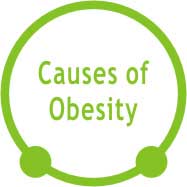|
|
|
|
|
Causes of Obesity
Obesity occurs when calories are consumed more than they are burnt. What causes this
imbalance between consuming and burning calories is unclear. Evidence suggests that
obesity often has more than one cause. They may include:
Age.
As you get older, your body's ability to metabolize food slows down and you do not
require as many calories to maintain your weight. This is why people note that they
eat the same and do the same activities as they did when they were 20 years old,
but at age 40, gain weight.
Gender.
Women tend to be more overweight than men. Men have a higher resting metabolic rate
(meaning they burn more energy at rest) than females, so males require more calories
to maintain their body weight. Additionally, when women become post-menopausal,
their metabolic rate decreases significantly. That is partly why many women gain
weight after menopause.
Genetic Factors.
Obesity (and thinness) tends
to run in families. In a study of adults who were adopted as children, researchers
found that participating adult weights were closer to their biological parents'
weights than their adoptive parents'. The environment provided by the adoptive family
apparently had less influence on the development of obesity than the person's genetic
makeup. In fact, if your biological mother is heavy as an adult, there is approximately
a 75% chance that you will be heavy. If your biological mother is thin, there is
also a 75% chance that you will be thin. Nevertheless, people who feel that their
genes have doomed them to a lifetime of obesity should take heart. Many people genetically
predisposed to obesity do not become obese or are able to lose weight and keep it
off.
Social Aspects.
Although genes are an important
factor in many cases of obesity, a person's social life also plays a significant
role. Social Aspects include lifestyle behaviours such as what & when a person
eats and how active he or she is.
Physical activity.
Active individuals require
more calories than less active ones to maintain their weight. Additionally, physical
activity tends to decrease appetite in obese individuals while increasing the body's
ability to preferentially metabolize fat as an energy source. Much of the increase
in obesity in the last 20 years is thought to have resulted from the decreased level
of daily physical activity.
Psychological factors.
Psychological factors also
influence eating habits. Many people eat in response to negative emotions such as
boredom, sadness, or anger. While most overweight people have no more psychological
disturbances than people at their normal weight, about 30% of people who seek treatment
for serious weight problems have difficulties with binge eating. During a binge-eating
episode, people eat large amounts of food while feeling they can't control how much
they are eating.
Illness.
Some rare illnesses can cause obesity. These include hormone problems such as hypothyroidism
(poorly acting thyroid slows metabolism), depression and some rare diseases of the
brain that can lead to overeating.
Medication.
Certain drugs, such as
steroids and some antidepressants, may cause excessive weight gain.
Obesity
|
|


|
|